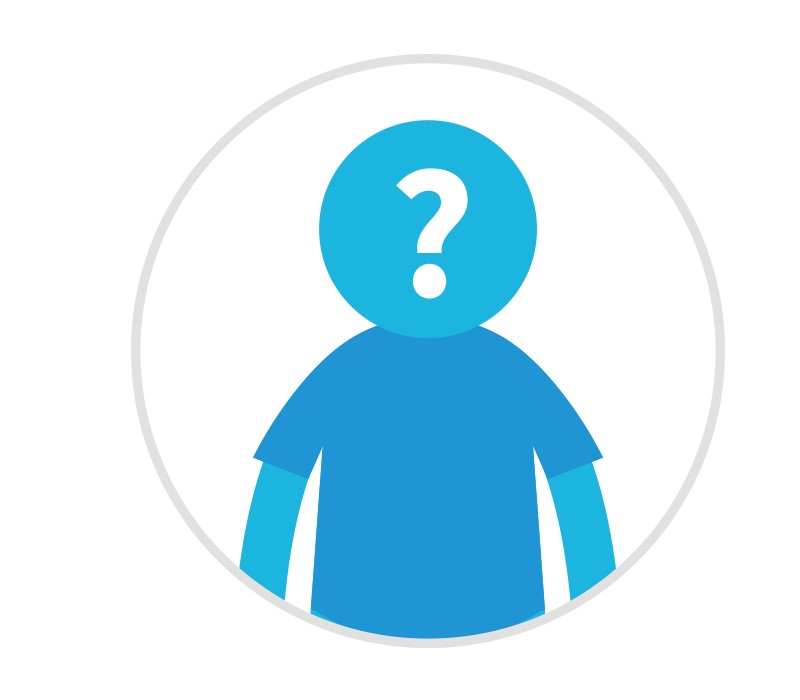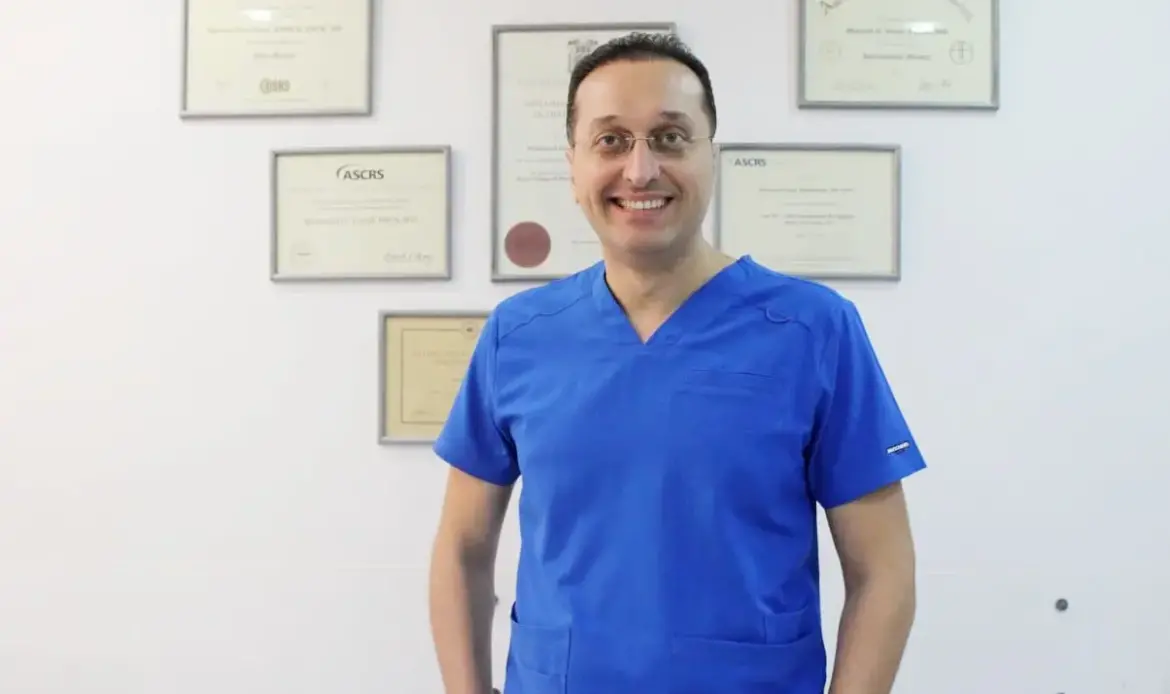Dr. Mohamed Omar Youssef, the best keratoconus doctor in Cairo, is a prominent eye consultant in corneal, cataract, and vision correction surgeries.
He is considered one of the most distinguished doctors in keratoconus treatment in Cairo, and many regard him as the best corneal specialist in Egypt and the Arab world.
Dr. Youssef is known for using modern and advanced techniques in treatment and for his ability to accurately diagnose the condition and determine its stage through initial examinations before deciding on the appropriate treatment.
These examinations include:
- Slit-lamp examination: This reveals complications and the progression of keratoconus.
- Corneal topography: This involves screening the cornea to map its surface.
- Pentacam: This advanced camera helps create a detailed topographic map, allowing for accurate diagnosis.
In this article, we will discuss why Dr. Mohamed Omar Youssef is rated as the best keratoconus doctor in Cairo, along with essential medical information about keratoconus, one of the most common eye disorders.
Expertise and Proficiency in Multiple Treatment Options
A key element of Dr. Mohamed Omar Youssef’s success and excellence in treating keratoconus is his ability to make accurate diagnoses and his deep understanding of choosing between various treatment options based on every case severity and classification. He is distinguished by his mastery of all keratoconus treatment methods and correctly implementing them.
Now, let’s explore the different treatment options for keratoconus that Dr. Mohamed Omar Youssef might choose from.
What Factors Should Be Considered When Choosing the Best Keratoconus Doctor in Cairo?
When searching for the best ophthalmologist specializing in corneal diseases, it is important to consider several attributes that the doctor should possess. Here are the most important qualities:
- Experience: Select a doctor with extensive experience in corneal treatment to ensure the best results and prevent potential complications. This includes both academic and practical experience.
- Specialization: Choose a doctor specializing in corneal treatment who performs these operations regularly, as he will be knowledgeable about all the specific details of corneal surgeries, unlike a general ophthalmologist.
Reviews: Check reviews from previous patients to get an idea of the quality of service provided.

ABDULWAHAB MOشهاده لله تعالى الدكتور محمد عمر عمل عملية زراعة قرنية لعدد كبير من قرايبي وأولاد عمومتي القادمون من اليمن الى أرض الكنانة لغرض العلاج ،و ما شاء الله تبارك الله لا يوجد أحد منهم اشتكى وكل العمليات ناجحة وبدقه متناهيه لا نظير لها، دكتور يستحق كل الشكر والحب والتقدير والامتنان، لا نستطيع أن نجزيك ايها الدكتور العظيم المخلص في عملك والصادق في قولك، جزاك الله عنا خير الجزاء.Read more
علي الخلاقيدكتور ممتاز جدا ومحترم وقمة الاخلاق في التعامل معا المريض عملية زراعة القرنيه ناجحه بفضل الله الف شكر لدكتور محمدRead more
Babiker Yousifبالجد دكتور راقي ومحترم جدا ومتمكن من عمله انا جيت له من السودان والحمد لله كان عند حسن الظن.Read more
Ramy Archesخدمة مرررة ممتازة، تجربتي مع هذا الطبيب فوق الممتازة، ربي يحفظك يا دكتور محمد ويوفقك ويزيدك من فضله.Read more
Ali Sabyaniدكتور متميز ومستمع جيد للمريض واهم مافيه الصدق والأمانة المهنية.Read more
Azza Elkadyبناء على الكثير من التجارب مع أساتذة وأطباء العيون أستطيع أن أجزم أن الدكتور محمد عمر يوسف هو أفضل دكتور عيون تعاملت معه، قام بإجراء عملية لوالدتي منذ عدة سنوات وكذلك لأختي وما شاء الله نتيجة رائعة منذ اليوم الأول للعملية وحتى الآن. عيادة متميزة وتعامل راقي على أعلى مستوى، ربنا يبارك في علمك وعملك يا دكتور محمد.Read more
Kawthar Mohamedمترددش لحظه اني اكشف عند دكتور محمد عمر والسبب سمعته الطيبة وخبرته الممتازة مع أشخاص رشحولي اني اكشف عنده وثقتهم فيه وكلامهم عن قد ايه دكتور ممتاز خلتني اروح وانا مطمنه جداا وفعلا كل كلمه ف حقه اتقالت م بعد م اتعاملت معاه قليله جداا ف حقه كمان ومتردد لحظه اني اعمل العمليه م غير تفكير والحمد لله اتحسنت كتير ومبسوطه م النتيجه جدااا. هفضل انصح اي شخص يلجألي عشان ارشحله دكتور عيون انه يروح لدكتور محمد عمر، شكراا جداا لحضرتك ولكل فريق العمل في العيادة ع حسن المعاملة والخبرة.Read more
صالح الغامديدكتور عيون مميز جدا جدا بمرتبة انسان يقدم مصلحة المريض على الاستفادة المادية والربح في زمن قل فيه أمثاله اسال الله له التوفيق والسداد والسعادة الدائمة وأن يبارك له في رزقه، كل الشكر لسعادة الدكتور والعاملين في العيادة.Read more
Ahmed Abdelrhmanدكتور محمد عمر هو الشخص الوحيد الممكن تديهو كامل ثقتك و انت مطمن، دكتور متمكن و ممتاز و شاطر جدا في كل حاجة ربنا يحفظه و يعلي مقامه، و كل التحية و الاحترام لفريق العمل داخل العيادة..قمة في الذوق و الادب و التعامل.Read more
What Are the Most Common Corneal Diseases?
The best keratoconus doctor in Cairo explains that the cornea is the transparent layer covering the eye’s surface, helping to focus light on the retina to form a clear image.
Several diseases can affect the cornea, causing damage, deformity, or inflammation, which negatively impacts vision. Here, we will discuss the most common corneal diseases.
Corneal diseases often result from changes in its shape due to structural, thickness, or curvature abnormalities, including:
- Fuchs’ Dystrophy: This condition leads to fluid accumulation within the corneal layers, causing swelling and increased thickness due to malfunctioning cells that remove fluid from the cornea. It results in blurred vision, especially in the morning, halos around lights, and eye pain.
- Keratoconus: This condition causes the cornea to change from a spherical to a conical shape, focusing light on multiple points on the retina, leading to blurred and weakened vision. It typically appears in adolescence or early twenties and worsens over time. Genetics and environmental factors, such as UV exposure and eye allergies, may contribute to its development.
Other corneal diseases often resulting from infections include:
- Keratitis: Caused by bacterial or fungal infection in the eye.
- Ocular Herpes: Caused by the herpes virus.
These are some of the most common corneal diseases affecting vision.
Next, we focus particularly on keratoconus and the role of the best keratoconus doctor in Cairo in its treatment and prevention of its severe complications.
Keratoconus Treatment Methods
Dr. Mohamed Omar Youssef aims to achieve two main goals in treating keratoconus:
- Slowing The progression of Keratoconus to prevent complications.
- Improving vision in cases where this is necessary.
Corneal Cross-Linking (CXL)
Dr. Mohamed Omar considers this the best option for early-stage keratoconus. This procedure involves using ultraviolet light and riboflavin (vitamin B2) to strengthen the collagen fibers in the cornea, thereby stabilizing it.
Glasses or Contact Lenses
Glasses or Contact Lenses are used when the aim is to improve vision, especially in mild to moderate cases of keratoconus.
Intacs or Corneal Rings
Intacs are used in keratoconus moderate stages to improve the corneal surface irregularities.
Surface Laser Treatment with Collagen Cross-Linking
This is used in specific cases where the corneal thickness allows for the application of a small dose of excimer laser to smooth corneal irregularities and eliminate visual distortions caused by keratoconus, followed by collagen cross-linking. This option is highly effective if performed correctly.
Partial or Full Corneal Transplant
This is the best option when the case has significantly worsened, making other options ineffective and unable to improve vision.
Protecting Patients from Complications
Dr. Mohamed Omar is always keen on protecting patients from potential complications due to untreated keratoconus. This involves making timely treatment decisions to avoid any delays that could lead to complications.
Now, let’s look at the potential complications that can occur if keratoconus is not treated promptly.
How Does the Best Doctor for Keratoconus Treatment in Cairo Choose the Right Treatment for Each Case?
Many patients ask, “What is the best treatment for keratoconus?” or “How do I choose the right surgery for my keratoconus?” The truth is that these questions are wrong from the start. There is no single treatment that is best for all cases, and the choice of surgery is not the patient’s responsibility.
Dr. Mohamed Omar Youssef determines the appropriate treatment method according to:
-
Diagnosis with Modern Equipment
The doctor uses the best modern and reliable devices to obtain accurate results, enabling him to evaluate the condition more clearly and determine the disease’s progression. Techniques like Pentacam screening and corneal topography give a clear picture of every condition.
-
Assessing the Patient’s General Condition
The doctor considers factors like age, medical history, potential complications, and other eye conditions. All these factors play a role in determining the appropriate treatment.
-
Listening to the Patient’s Complaints
The patient might have other eye-related issues that need treatment first or require an additional treatment plan alongside the specialized corneal treatment, such as dry eyes or allergies.
-
Experience and Practice
The doctor’s experience in treating similar cases is crucial in making the right decision. Each case is treated individually, and a tailored treatment plan is created for each patient.
-
Keeping Up with the Latest Developments in Ophthalmology
A distinguished doctor follows the latest research, studies, and new techniques in ophthalmology and corneal disease treatment.
When Does the Doctor Resort to Corneal Transplantation for Keratoconus Patients?
The doctor resorts to corneal transplant surgery for patients with keratoconus when the condition progresses to a stage where vision becomes extremely poor or when the condition does not respond to less complex treatments such as contact lenses or glasses.
Or when he determines that corneal cross-linking or the insertion of intrastromal rings would not be suitable options for the patient’s condition.
Symptoms Indicating the Need for Corneal Transplantation:
- Severe vision blurriness.
- Extreme sensitivity to light.
- Increased glare and halos around lights.
- Increased severity of double vision.
Through the corneal transplant procedure, Dr. Mohamed, the best keratoconus doctor in Cairo, aims to replace the diseased cornea with a healthy donor cornea to improve vision and prevent vision loss (functional blindness).
What Are the Complications of Not Treating Keratoconus?
Several complications may occur if the doctor does not intervene on time to treat keratoconus, including:
- Rapid corneal swelling: leading to sudden vision loss due to the breakdown of the inner corneal lining. While this swelling usually subsides over time, it can leave corneal opacities and scarring that affect vision later.
- Corneal scarring: a severe stage of keratoconus that significantly affects vision quality and may necessitate corneal transplantation.
The best doctor for keratoconus treatment in Cairo is one who can make timely treatment decisions before keratoconus problems worsen and lead to these complications.
Possessing the Necessary Medical Knowledge
Dr. Mohamed Omar Youssef has extensive medical knowledge related to keratoconus, enabling him to accurately answer all patient questions and concerns.
This expertise has qualified him to be considered the best doctor for keratoconus treatment in Cairo by many.
Below are some frequently asked questions by keratoconus patients that patients should be well-informed about before deciding to undergo surgery.
Keratoconus related FAQs
Is it possible to completely cure keratoconus?
There is no definitive cure for keratoconus yet, but available treatments can effectively manage the condition and slow its progression, helping to avoid complications as much as possible.
Is LASIK possible for keratoconus patients?
LASIK cannot be performed on individuals with keratoconus because it is a progressive condition that leads to unpredictable and irregular changes in the shape of the cornea’s surface.
Does keratoconus cause headaches?
Headache is a common symptom in advanced cases of keratoconus. It occurs due to repeated eye strain and increased sensitivity to light.
Is keratoconus a hereditary disease?
Genetics is not the only factor responsible for the development of keratoconus. Environmental factors and other medical conditions, such as certain allergies that lead to harmful eye rubbing, also contribute to its progress.
Does keratoconus lead to blindness?
Keratoconus typically does not lead to complete blindness if left untreated. However, it can result in severe vision impairment, making it difficult for the affected person to perform daily activities and functions normally.
Related Articles:

